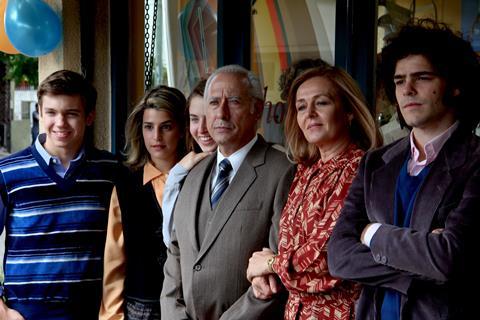Dir/scr. Pablo Trapero. Argentina, Spain, 2015. 108 min.

Pablo Trapero’s singularly angry, loud and frantically sarcastic film The Clan is more than just the story of the infamous Puccio family, who kidnapped people in Buenos Aires for ransom only to kill them after collecting the money, but also a political parable intimately related to Argentina’s historical background. This solid festival title threads historical events throughout the film, and surely stands a shot at becoming Argentina’s Oscar submission with its high-profile producers including Spain’s Almodovar brothers.
Looking at these people, one is tempted to wonder what one’s next door neighbors are capable of, in their free time.
It is indeed impossible not to draw parallels between the sinister activities of the seemingly highly respectable, God-fearing Puccio family from San Isidro, a traditional, middle class Buenos Aires neighborhood, and the military junta who ruled over Argentina in the late seventies and early eighties and tortured or “disappeared” anyone even vaguely suspected of subversive tendencies.
Arquimedes Puccio goads, cajoles, browbeats and bribes in order to get his son’s support, using the same vocal tones and with the same authoritative arguments employed by the generals to justify their conduct to the people. (To underline this, Trapero shows real footage of the junta, including General Leopoldo Galtieri explaining on TV that losing the Malvinas was not really a defeat).
The cellar in which the Puccios kept their victims and the government’s unofficial jails were not dissimilar. Tacit collaboration with the Puccio family, whether active or passive, is more than reminiscent of all those who knew but never said a word, either out of fear or personal comfort.
Using his older son, Alejandro (Peter Lanzani), a much admired rugby star, as a decoy, Arquimedes Puccio (Guillermo Francella) selects his victims from the wealthier families in Buenos Aires. He orchestrates their capture, beats them up, keeps them in seclusion and forces them to write letters asking for help. He then makes phone calls to their relatives implying he represents a dark, secret organisation which is cooperating with the government, an easy enough assumption to sell given the climate of terror reigning at that time on the Argentine streets.
Arquimedes asks for money not just in cash but in American dollars, gives precise instructions on how it is to be delivered, and once the payment is made, he has the victim shot, to prevent any risk of identification.
The terrifying part is of course that for the Puccios, all this is just a line of business like any other, and one which does not affect their normal routines. Wife Epifania (Lili Popovich) goes on teaching at school, the couple’s two daughters prepare their homework with Daddy’s help, the younger son watches but never utters a word, and Alejandro’s doubts are sufficiently allayed by his father to keep him going.
Family dinners always start with a prayer, and they all trust Arquimedes, who looks just like a middle-aged, white haired, respectable businessman.
Shielded by corrupt law enforcement, whose heads, incidentally, do not change with the end of the junta, the Puccios are allowed to pursue their criminal career until they over-reach themselves by grabbing a woman whose family’s connections are too powerful to ignore.
With the film immediately placed into high gear even before the opening credits are completed, Trapero impetuously drives his own script forward. He never misses a chance to display his own jaundiced view of the higher echelons of his country’s society, which never stopped having a ball even during the darkest times. There are many violent sequences, accompanied occasionally by happy, classic pop tunes such as the Kinks’ Sunny Afternoon, a bit like Singing in the Rain accompanying the rape in Kubrick’s Clock Orange. .
Shot like a documentary on the raw, Trapero edited his film at such hectic pace that sometimes it defies continuity. His insistence on juxtaposing sex with torture for longer than necessary may seem just a bit too obvious. But he has the benefit of a scarily normal cast, headed by Guillermo Francella, whose steely eyes barely conceal the ferocious nature hiding behind them. Looking at these people, one is tempted to wonder what one’s next door neighbors are capable of, in their free time.
Production companies: Kramer & Sigman Films, Matanza Cine, El Deseo
Producers: Hugo Sigman, Matias Mosterin, Agustin Almodovar, Pedro Almodovar, Esther Garcia, Pablo Trapero
International Sales: Film Factory, info@filmfactory.es
Cinematography: Julian Apezteguia
Editors: Pablo Trapero, Alejandro Carillo Penovi
Production design: Sebastian Orgambide
Sound: Vicente d’Elia
Cast: Guillermo Francella, Peter Lanzani, Lili Popovich, Gaston Cocchiarale, Giselle Motta, Franco Masini, Antonia Bengoechea, Stefania Koessl
























